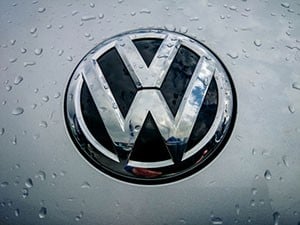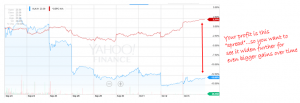Preconditioned to "buy the dips" and capitalize on special situations, millions of investors have picked up shares in Volkswagen AG (OTCMKTS ADR: VLKAY) with the hope of making a killing on the rebound.
I think that's a mistake.
No doubt special situations can create huge profits, but what's happening now with VW stock is very different and poses special risks other "turnarounds" don't.
We're going to talk about that today and, while we're at it, take a quick look at the trade recommendation I gave you last week to play the situation.
It's returned 15% in just eight trading sessions and is primed for a whole lot more in the months ahead.
How much more?
Nobody knows for certain, but taking our cue from other winning recommendations like Raytheon, Altria, and FleetCor, which I've recommended over the years under similar circumstances, there's clearly double or even triple-digit profit potential.
Here's what you need to know.
Newly Designated VW CEO Hans Dieter Poetsch Agrees with Us
 I minced no words when the VW emissions scandal broke, calling the situation "an extinction-level event." Others didn't see it that way, and I got my fair share of emails from those who thought I was being too harsh.
I minced no words when the VW emissions scandal broke, calling the situation "an extinction-level event." Others didn't see it that way, and I got my fair share of emails from those who thought I was being too harsh.
Now, millions of investors are coming around as the plot thickens and more information comes to light about just how damaging the situation actually is.
Two engineers, Ulrich Hackenberg, Audi's chief engineer, and Wolfgang Hatz, a Porsche Formula One engine whiz, are being painted as possible culprits. They were "under pressure" to come up with a viable solution for strict U.S. markets, goes the story.
Call me crazy, but that sounds like lawyers in overdrive who are going to try to position the engineers as hardworking good guys who simply took a wrong turn in the pursuit of continued excellence. It's a feeble attempt - in my opinion - to deflect potential damage away from VW itself.
Ultimately, though, it won't work, and I think VW's new CEO Hans Dieter Poetsch knows it.
The company took out full-page advertisements in German newspapers like Wel am Sonntag last week, pleading for support and trust because the company's diesel-emissions scandal is an "existence-threatening" crisis for the company.
Never mind the "who" here. It's the "what" that matters.
The VW scandal affects more than 11 million vehicles around the world, and there's no way to know how much money will be required to pay the resulting regulatory penalties, let alone how much money will be sucked up by lawsuits.
And that's what makes the VW situation different.
Normally special situation plays are based on a single event or premise that's both containable and assessable. So you know going in what the downside is before you worry about the upside.
The Concordia disaster in Italy is a good example. Investors knew relatively quickly what the liability would be for Carnival Cruise Lines, a subsidiary of Carnival Corp. & Plc., a point noted by George Young, a partner at Villere & Co.
In this case though, you cannot calculate the downside because it's completely unknown. So any upside growth potential that would otherwise be a factor is irrelevant.
For instance, 81% of fleet operations in the UK use diesel engines and 62% of fleet operators there state that they are less likely to trust manufacturers' claims following the VW scandal, according to Sewells Research and Insight. Some 49% are now considering other marquees for their fleet choice lists.
At the same time, Fiat Chrysler Automobiles NV has gone on the offensive in Italy, offering VW drivers an additional discount of $1,700 to ditch their German clunkers. Ford has stepped up with a €750 incentive for VW owners interested in crossing brand lines there, too.
Meanwhile, VW is exploring a range of options to fix affected cars. Estimates range from €20 to more than €10,000 a car, according to Bloomberg quoting anonymous sources. That's a potential cash impact of €220 million to €110 billion. The company's entire market capitalization is only $57 billion.
The company is also cutting back on all non-essential spending. That's huge considering that VW spent more on R&D than Ford and GM combined. And that means the company is going to have to evoke happy thoughts, memories, and the get-on-the-road vibe that VW enjoyed for years. In other words, VW will have to separate the scandal from the brand to survive.
And, finally, in the words of branding expert Jim Prior of Lambie-Nairn in London, VW will "have to live with the legacy of being a brand that cheated."
All of these things will impact earnings for years to come... assuming VW has any.
So how do you play this?
I believe that VW will be an underperformer but, thanks to the fair number of folks who are "holding and hoping," not necessarily a great short all by itself. So the key is to find a trade and the tactics that go with it to play the difference.
I suggested just such a trade to you on Sept. 23, a "pairs trade" that was simultaneously long the S&P 500 and short VW shares.
If you put $10,000 in that trade as directed at the close, your positions would have been worth $11,544.48 as of yesterday's close, a mere eight trading days later.
Here's how the math breaks down.
Assuming you followed along as directed on Sept. 23, you would have shorted $10,000 worth of VKLAY. Using closing prices for simplicity, that means you'd be short 360 shares at $27.10 per. Simultaneously, you would have purchased $10,000 worth of SPY, or 51.65 shares at the closing price of $193.60. (Note: I've excluded commissions and rounding here for illustrative purposes.)
Eight trading days later, on Oct. 5, VLKAY closed at $23.36, so you would have a gain of $3.74 per share, or $1,346.40, on this half of the trade. SPY closed on the same day at $198.48, so you would have a gain of $4.88 per share, or $252.05, on this half of the trade. Together, that's a total gain of $8.62 per share, or $1,544.48, for a total return of 15.44% in only eight trading days.
As long as the "spread" between the two instruments - the SPY and VLKAY - continues to widen, the trade will gain value and, chances are, you'll be grinning like a Cheshire Cat for having made your move.

Click to Enlarge
Now, are there other ways to play this trade?
I've gotten that question a lot over the past week or so. The answer depends, as always, on your personal risk tolerance, objectives, and experience.
For example, I can see buying at-the-money put options on VW stock. It's a simple, limited-risk trade, albeit one that's a more direct bet that VW will drop. I could also envision a bear call spread, which would profit as VW drops further.
And if you really do want to go bottom fishing, there's always a Total Wealth favorite, the lowball order. In this case, the danger is getting dragged into the trade too early before the damage is done. That means you'd want to think about placing one or even a series of orders at "impossibly low prices" ranging from $15 to perhaps $20.
In closing, I think the original pairs trade I suggested on Sept. 23 still offers the most flexibility while keeping risk to razor-thin levels. That's because it's a broader take on the VW situation versus the overall markets which, odds are, don't have emissions problems of their own.
It's not too late to take the trade if you still want in.
Follow us on Twitter @moneymorning.
Editor's Note: Keith's "pairs trade" strategy gave readers who followed along the chance to capture 15% gains within two weeks - no small feat in today's markets. But he's got his eye on a play that could outperform the markets even more drastically - and it already doubled within six weeks of his recommending it to Total Wealth readers. His calculations project its growth is just beginning as it seizes a hold on the booming Human Augmentation industry. For a full and free report on the company - including ticker symbol - click here to sign up for Total Wealth - it's free!
About the Author
Keith is a seasoned market analyst and professional trader with more than 37 years of global experience. He is one of very few experts to correctly see both the dot.bomb crisis and the ongoing financial crisis coming ahead of time - and one of even fewer to help millions of investors around the world successfully navigate them both. Forbes hailed him as a "Market Visionary." He is a regular on FOX Business News and Yahoo! Finance, and his observations have been featured in Bloomberg, The Wall Street Journal, WIRED, and MarketWatch. Keith previously led The Money Map Report, Money Map's flagship newsletter, as Chief Investment Strategist, from 20007 to 2020. Keith holds a BS in management and finance from Skidmore College and an MS in international finance (with a focus on Japanese business science) from Chaminade University. He regularly travels the world in search of investment opportunities others don't yet see or understand.



